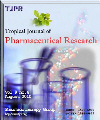
|
Tropical Journal of Pharmaceutical Research
Pharmacotherapy Group, Faculty of Pharmacy, University of Benin, Benin City, Nigeria
ISSN: 1596-5996
EISSN: 1596-5996
Vol. 12, No. 5, 2013, pp. 851-856
|
 Bioline Code: pr13107
Bioline Code: pr13107
Full paper language: English
Document type: Research Article
Document available free of charge
|
|
|
Tropical Journal of Pharmaceutical Research, Vol. 12, No. 5, 2013, pp. 851-856
| en |
A Multifactorial Intervention to Enhance Adherence to Medications and Disease-Related Knowledge in Type 2 Diabetic Patients in Southern Punjab, Pakistan
Samtia, Abdul Majeed; Rasool, Muhammad Fawad; Ranjha, Nazar Muhammad; Usman, Faisal & Javed, Ibrahim
Abstract
Purpose: To assess the impact of pharmacist-led multifactorial interventions on health parameters, medication adherence, and disease-related knowledge among type 2 diabetic patients in southern Punjab, Pakistan.
Methods: The effect of intervention was evaluated by randomly assigning patients into control group (n = 170), receiving conventional medical care, and intervention group (n = 178), receiving predefined specialized care. The primary outcome of this intervention study was improvement in glycemic control which was assessed by measuring fasting blood glucose and glycosylated haemoglobin (HbA1c) values.
Results: The outcomes obtained clearly show the role of pharmacist counseling in the control of type 2 diabetes while improving fasting blood glucose (FBG) and HbA1c levels, reduction in Body Mass Index (BMI), improvement in disease knowledge as well as reduction in smoking. The intervention significantly reduced BMI and waist circumference by a difference of 1.87 (p = 0.014) and 1.27 (p = 0.002) between control and intervention groups. Glycemic control was significant within the intervention group, as evident by a reduction in fasting blood glucose level {-19.26 mg/dL (p = 0.003)} and HbA1c level {-1.01 % (p < 0.001)} compared to control group. The mean difference in glycemic control between both groups was insignificant but mild reductions were seen in fasting blood glucose (-11.95 mg/dL, p = 0.11) and HbA1c (-0.43 %, p = 0.12). A significant increase in disease-related knowledge was seen in the intervention group, compared to the control group which was evident by mean differences in compliance (p = 0.003), foot-care (p < 0.001) and self-monitoring of blood glucose (p = 0.001).
Conclusion: The purpose of study was achieved in that it demonstrates that pharmacists can play a pivotal role in improving glycemic control in diabetic patients and that involvement of pharmacists in diabetic clinics is beneficial to the patients in terms of medication adherence and promotion of healthy lifestyle.
Keywords
Diabetes; Intervention; Medication adherence; Glycemic control; BMI; HbA1c
|
| |
© Copyright 2013 - Tropical Journal of Pharmaceutical Research
Alternative site location: http://www.tjpr.org
|
|
